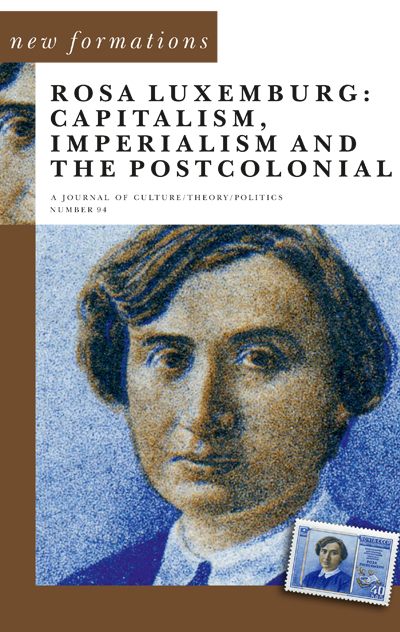
Rosa Luxemburg and the heart of darkness
New Formations - ISSN 0950-2378
Volume 2018 Number 94
Rosa Luxemburg and the heart of darkness
Paul Le Blanc pages -
DOI: 10.3898/NEWF:94.08.2018
Abstract
‘Imperialism’, Rosa Luxemburg tells us, ‘is the political expression of the process of the accumulation of capital in its competitive struggle over the unspoiled remainder of the noncapitalist world environment’. The realities analysed by this outstanding socialist revolutionary have also found significant reflection in classic writings of such literary icons as Herman Melville, Joseph Conrad, Mark Twain, Rudyard Kipling and George Orwell. Conrad’s racist conceptualisation in The Heart of Darkness shows us an idealistic imperialist, Kurtz, whose last words - ‘the horror’ - can be understood in opposite ways:as an idealism grotesquely corrupted when a ‘civilising’ white ‘goes native’ or, more persuasively, as a grotesque violence emanating from ‘progressive’ capitalist civilisation itself. Dark horrors visited upon innumerable victims in Africa, Asia, Latin America and among indigenous peoples of Australia and North America have been generated, as Luxemburg demonstrates in The Accumulation of Capital, from the very heart of European civilisation, permeated and animated as it is by the capital accumulation process. The eloquent justifications of Kurtz can be found in the glowing prose of - for example - Winston Churchill: ‘Let it be granted that nations exist and peoples labour to produce armies with which to conquer other nations, and the nation best qualified to do this is of course the most highly civilised and the most deserving of honour.’ Yet the actual impacts have been summarised by W.E.B. Du Bois: ‘There was no Nazi atrocity - concentration camps, wholesale maiming and murder, defilement of women or ghastly blasphemy of childhood - which the Christian civilization of Europe had not long been practicing against colored folk in all parts of the world in the name of and for the defense of a Superior Race born to rule the world.’ Such horrors have afflicted not only vast ‘peripheries’ but have also defined modern and contemporary history in the civilised ‘metropolis’.
SORRY - you are not registered as being permitted online access to the full text of this article
You have the following options:
- If you are viewing this via an institution or academic library you can ask that your institution takes out a Subscription to this journal.
- If you already have a Personal Subscription please login below
Forgotten your username / password? Click here to locate
- Purchase an annual Personal Subscription
PRINT + DIGITAL personal subscription (£45 / year)
DIGITAL personal subscription (£30 / year)
A Personal Subscription provides immediate access not only to the single article you are seeking, but also to all past and future articles in this journal up to the expiry of your annual (calendar year) subscription. - Purchase immediate access to this single article (UK£7.00) - Buy article Coming Soon
To cite this article
Paul Le Blanc (2018) Rosa Luxemburg and the heart of darkness, New Formations, 2018(94), -. https://doi.org/10.3898/NEWF:94.08.2018
